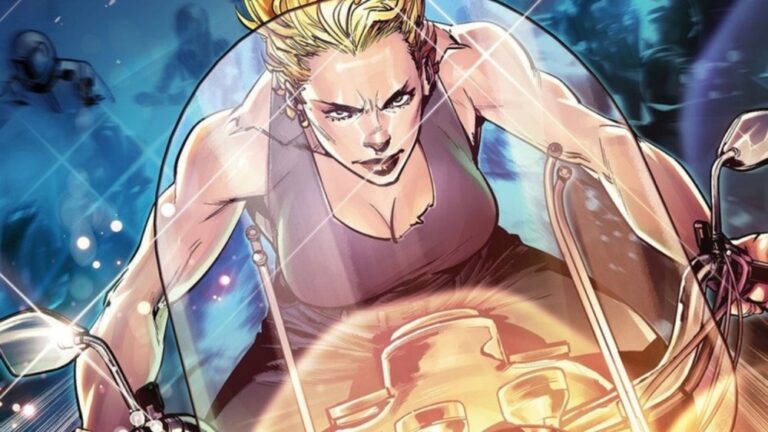Dark Honor is certainly a proper title. You are the only one who reviewed all five main issues.
The obvious cheese (and occasional incompetence) of this “Covid Crime Caper” isn’t necessarily so easy to keep reading. However, the more nuanced commentary in the book on social change spurred by the pandemic was clearly enough to maintain my interest. In general, it hasn’t always been a great time, but it’s an important and relevant story, and perhaps that’s something that’s more needed in recent comics.
But whether the series was an honor or just a practice of self-torture, it all comes down to the grand finale. Did Dark Honor #5 paste the landing for something luxurious and cheap, but nevertheless thoughtful and persuasive? Or was this all a bad fever dream?
And, yeah, that’s generally both.
Courtesy of the image comic.
To this conclusion, Bad Guigligor was one important thing that led to accessing the vast wealth of his family, with only the rain being able to get in his way. With her father Joseph dead, Lane had to continue to do 100 or go, and decide whether to make her own life instead.
And she was given two boxes that literally represent each “pass” in the sense that I had to choose. I’m probably going to guess what she’s chosen, but gimmickley aside, I’m almost pleased that the writers (including Brian Decobellis, KS Bruce and Ethan Sack) have finally put an emphasis on our lead. After the rain comes, and feels like an afterthought across the first four issues, Dark Honor #5 has the opportunity to become a real person, and she leans into established character traits (nasty gambling habits) and helps determine a solid, perfect circle moment. It’s also a bit ridiculous and may be harmful to people in real recovery, but I’ll eventually take it to make the rain feel unique and special. Certainly she’s still a small note, but at least for now she’s in the driver’s seat.
But don’t expect it to resonate too emotionally. (Or perhaps not only resonates, it’s also wonderfully robust/complex.) Rather, rain spends most of this problem riding a motorcycle and fighting Grigor. And, as with FICO Ossio and David Messina, problem artist Jamal Igle brings power and grace when it comes to these battle scenes. (It is worth noting that despite the artist’s changes across the issues, it really helped me to continue immersing despite the consistent look and feel of the book.) It includes well-developed fight coography.
In some respects, much of this issue felt like eating fast food – we know it’s a real value (or lack of it), but it’s wonderfully fulfilling everything and we want to make ourselves a canyon regardless. Dark Honor has always nailed this aspect of the story. And even if the anatomy of the symbiotic-centric theme has shaken to some extent, we always rely on action and hope that the rest will fall into place.
So did you do that? Did Dark Honor have something important to say about Covid in the end? The story certainly says a few things before this issue, hinting at equality exacerbated by the pandemic, and that it was an opportunity for once in a lifetime reform. But what was the final message, and did it capture this unique multifaceted question of intention and efficiency?
ah.
Courtesy of the image comic.
To better understand what Dark Honor has to say, it’s important to know that it has basically turned the interesting and organically made Grigor into something merely the villain of a cheap James Bond. (The finale also made Aja feel like a bond’s love interest, but perhaps the character was just destined from the start?)
To some extent, the change with Grigor fits at least the obsession of the action film in this book. This is a small but powerful gesture of how this issue ultimately tunes many threads and finally found a way to say what’s really important using those over-the-top energy. (It’s like rain and gambling.) The problem is that the final message doesn’t exactly have a lot of weight, and you’re basically going to abandon the old world and create a new version of 100.
Certainly, the key vein of that very message is to explore the changing power dynamics and solidify the working class’s awakening like never before. But it was ultimately a kind of “bigest” wish fulfillment, and the final splash page was very cheap in a book with over a million versions of cheese from Plymouth, Wisconsin. Certainly, that’s a bit disappointing from an intellectual point of view, but perhaps it’s okay – pretty good. Maybe it was something we needed, in contrast to a “guide” of sorts of motivation to actually tackle wealth inequality and social stagnation. Even if the aforementioned process is considered a sweet death scene involving a giant radio tower.
Because dark honor is not afraid to connect with everything, even if absolutely nothing. I wasn’t always effectively managing those ideas and concepts, but I still managed to get through them. And, perhaps what we most needed most, to think about all the madness and existential fears of the past five years, to give shape to a real planet of sorrow and rage, was clearly and unwavering cheer/excitability. We obviously didn’t get it in real life, so perhaps a dark honor could say, through its many imperfections, “The world can change, and you can live to enjoy that new world.” Or, “All your struggle and pain is worth it because you fake something different.”
In any case, Dark Honor was the fulfillment of the highest wishes: the kind that taught us what we need when we most need to hear it. Perhaps the resulting message is not exactly groundbreaking, but it’s about its impact on actual content. And in that way, the book was extremely human (reading: enthusiastic but incomplete) in its goal of bringing us to life when it is still difficult to do.
Courtesy of the image comic.
I recall Simon Pegg’s quote from his recent Criterion Clotert closet visit. Speaking about showing her daughter David Lynch’s blue velvet, Peg explained: “I was happy that Tilly hated it because she spoke non-stop that night the next day. And then she said, “Entertainment can be an overestimation of art. God. Also, do you think this was intentional? Also, no.
But all I can say is that the dark honor was exactly that. And it excited me with an exaggerated behavior (although almost superficially), but it mainly kept me engaged and tried hard (probably not). I probably would have read and analyzed another book. But I didn’t and I spent time in Dark Honor. Because I think it’s worth coming to the end and feeling a lot of what I still feel and deciding what value I want to hold as both a reader and a critic.
It’s not worth it for others, but rather, the story can only be important when it affects the selection group. At the end of the day, the book moved me and rethinked major events and ideas. It became important for something, even if that effort was half cocked or even half in the end.
Honor really seems to have been mine forever.
“Dark Honor” #5 Review: The heat is broken, and we are generally alive and well
Dark Honor #5
Through some fun highs and nasty lows, Dark Honor is a worthy book to tackle recent tragedy and recent tragedy in action.
Once again, this art gives us a big, intense acton.
The rain can finally stand on its own, and it is worth it even if it’s too late.
The story, although in an imperfect way, achieved the goal (talk about Covid).
Grigor gets a bit of a gimmick here, and that’s a shame.
The final message is not exactly novel (even if it is superficially simulated).
#5 has a moment that may even be too hokey for the biggest action movie lovers.


